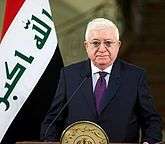President of Iraq
| President of Iraq | |
|---|---|
|
| |
| Style | His Excellency |
| Residence | Radwaniyah Palace Baghdad, Iraq |
| Appointer | Parliamentary vote |
| Term length | Four years, renewable once |
| Inaugural holder | Muhammad Najib ar-Ruba'i |
| Formation | July 14, 1958 |
_of_Iraq_2008.svg.png) |
| This article is part of a series on the politics and government of Iraq |
| Constitution |
|
Legislature |
|
Judiciary |
|
The President of Iraq is the head of state of Iraq and "safeguards the commitment to the Constitution and the preservation of Iraq's independence, sovereignty, unity, the security of its territories in accordance with the provisions of the Constitution".[1] The President is elected by the Council of Representatives by a two-thirds majority,[2] and is limited to two four-year terms.[3] The President is responsible for ratifying treaties and laws passed by the Council of Representatives, issues pardons on the recommendation of the Prime Minister, and performs the "duty of the Higher Command of the armed forces for ceremonial and honorary purposes".[4]
Presidency Council
The Presidency Council was an entity that operated under the auspices of the "transitional provisions" of the Constitution. According to the Constitution, the Presidency Council functioned in the role of the President until one successive term after the Constitution was ratified[5] and a government was seated.[6] The Presidency Council had the additional power to send legislation back to the Council of Representatives for revision.
See also
References
- ↑ Constitution of Iraq, Article 64
- ↑ Constitution of Iraq, Article 67
- ↑ Constitution of Iraq, Article 69
- ↑ Constitution of Iraq, Article 70
- ↑ Constitution of Iraq, Section 6, Chapter 2, Article 138
- ↑ Constitution of Iraq, Section 6, Chapter 2, Article 139
